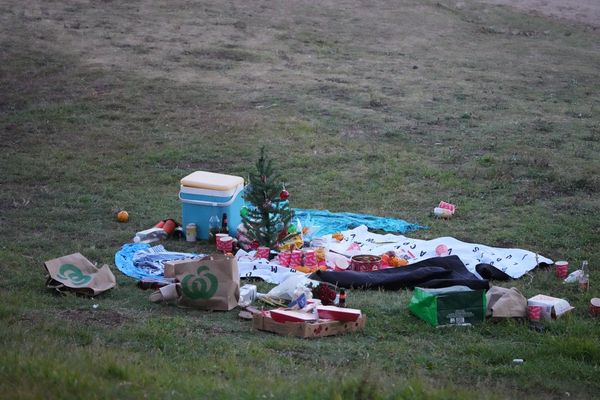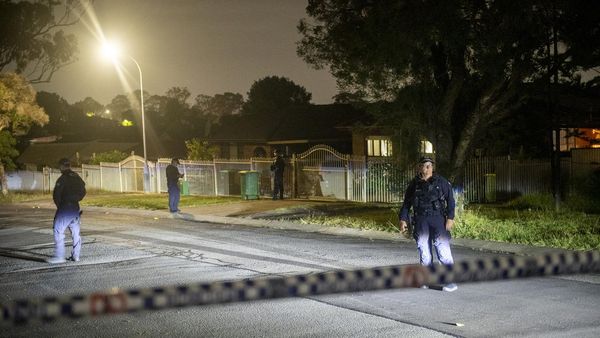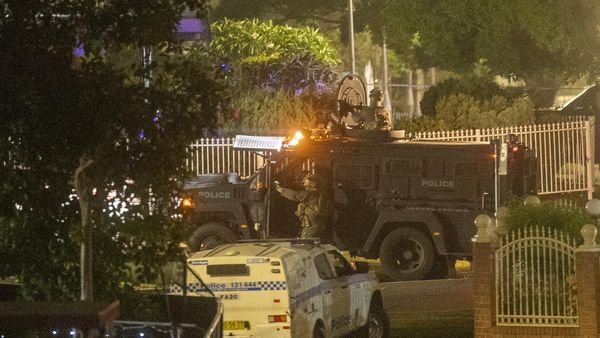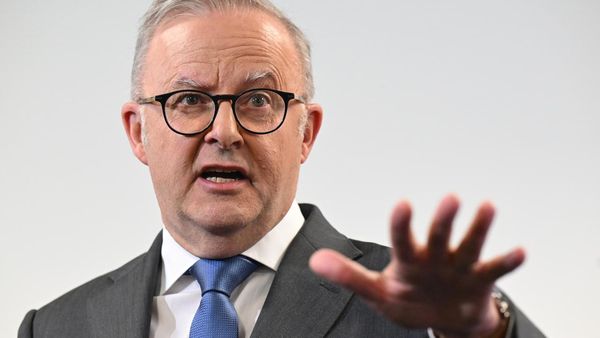Russia has fired dozens of missiles at Ukraine in a new onslaught against the country’s civilian infrastructure, killing at least six people in residential areas, as Moscow once more tried to retaliate for its military defeats by targeting the population.
Ukraine’s armed forces estimated that Russia launched 70 cruise missiles, of which 51 were intercepted by air defences, in what the army called a “large-scale attack on crucial infrastructure facilities”.
Kyiv’s mayor, Vitali Klitschko, said 21 out of 31 missiles targeting Kyiv were shot down before they reached their targets. One of the 10 that evaded the defences hit an apartment block in Vyshgorod, a northern suburb of Kyiv, killing three people and wounding 15.
There was a kindergarten in the lower ground floor of the building, but it was evacuated just in time after air raid sirens went off. The blast left a 3-metre crater in front of the building, destroyed the apartments around it, blew the tops of nearby trees and ruined a children’s playground.
“It flew right over us. We heard a whistling sound and then it came down on the building,” said Ruslan Vorona, a local resident. He and his eight-year-old son, Oleksii, were sheltering and charging their phones in an insulated tent set up by the emergency services.
Another local man, Oleksandr, 28, who would not give his last name, said: “There were a few explosions. Two were quieter and one was louder, and one of the missiles went straight over my head.”

On Wednesday night, rescue workers were trying to salvage the remaining household possessions of the families left homeless by the blast, tying what they could find in sheets and throwing them to the ground from the four-storey brick building.
There was not much left, but the emergency workers had made promises that they would save what they could, and they risked serious injury clambering through the wreckage to keep their word.
Earlier in the day, a newborn baby was killed when a Russian rocket struck a hospital maternity ward in southern Ukraine. Ukraine’s state emergency service said a woman with her two-day-old baby and a doctor were in the facility in the town of Vilniansk, close to the city of Zaporizhzhia, when it was hit. The mother and the doctor were pulled alive from the rubble by rescue workers but the baby died, it said on the Telegram messaging app.
Video footage and photos posted by the state emergency service showed a man who appeared to be a doctor being given water as rescuers tried to clear the rubble around him.
“Grief fills our hearts – a baby who had just appeared in the world has been killed,” Oleksandr Starukh, the governor of the Zaporizhzhia region, which includes Vilniansk, wrote on Telegram.
Andriy Yermak, the head of the Ukrainian presidential office, condemned the attack in a Telegram post. Calling the Russian forces who invaded Ukraine in February “terrorists”, he said Russia would be held responsible for “every Ukrainian life”.
Since the beginning of the invasion, the World Health Organization has reported more than 600 attacks on healthcare facilities, personnel and transport in Ukraine, which have killed at least 100 people.
In one of the most notorious attacks, Russian bombs on 9 March destroyed a children’s and maternity hospital in Mariupol, injuring dozens of people and killing four, including a pregnant woman and her baby.
The Russian ministry of defence claimed the bombing of the hospital was justified by the supposed presence of Ukrainian armed forces, but the Organisation for Security and Co-operation in Europe (OSCE) concluded in a fact-finding report in April that the airstrike was a war crime.
Ukraine’s first lady, Olena Zelenska, expressed her condolences after Wednesday’s attack in Vilniansk. She said: “Horrible pain. We will never forget and never forgive.”
Dozens of missiles were launched against Ukraine on Wednesday morning, with explosions heard in Mykolaiv and Dnipropetrovsk regions. Air raid alerts were heard all over the country, and Anton Gerashchenko, an adviser to Ukraine’s interior ministry, urged people to stay in shelters.
Andriy Sadovyi, the mayor of the western city of Lviv, said the entire city was “without light” after the attacks.
The impact of the strikes also spilled into neighbouring Moldova, where Andrei Spînu, the deputy prime minister and infrastructure minister, said the country had experienced a “massive blackout”, adding that Moldelectrica, the state company running the power grid, was “working to reconnect more than 50% of the country to electricity”.
In recent weeks, Russia, in an attempt to force Ukraine to negotiate a peace, has been trying to destroy its energy infrastructure with a series of mass strikes. No energy system in the world has been subjected to such powerful airstrikes. A long period of blackouts is threatened as Ukrainians are bracing for what is expected to be the hardest winter in the country’s history.
Volodymyr Kudrytskyi, the head of Ukraine’s national power grid operator, Ukrenergo, told a briefing on Tuesday that practically no thermal or hydroelectric stations had been left unscathed by the Russian attacks. “The scale of destruction is colossal. In Ukraine there is a power generation deficit. We cannot generate as much energy as consumers can use,” he said.
A big energy provider said on Monday that Ukrainians needed to get used to living in power outages at least until the end of March. The government has offered to evacuate people living in recently liberated Kherson, which is still mostly without electricity and running water.
“Given the difficult security situation in the city and infrastructure problems, you can evacuate for the winter to safer regions of the country,” the deputy prime minister Iryna Vereshchuk said on Telegram.
Meanwhile the European parliament was hit by a cyber-attack hours after the assembly voted to label Russia a terrorist regime and urged democracies around the world to follow suit. A pro-Kremlin group, Killnet, said it was responsible for the attack, which for a short time restricted access to the parliament’s website.
“My response: #SlavaUkraini [glory to Ukraine],” tweeted the European parliament president, Roberta Metsola.
Additional reporting by Jennifer Rankin in Brussels







